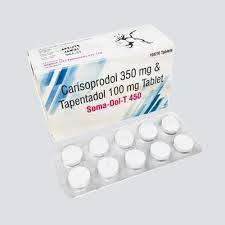Carisoprodol-T
Carisoprodol-T generally refers to Carisoprodol, which is the generic name for Soma, a muscle relaxant utilized for the management of acute musculoskeletal pain. The “-T” suffix may indicate a specific brand or formulation from a particular manufacturer or a regional variant, but the active ingredient and its effects remain consistent with standard carisoprodol.
Overview of Carisoprodol (Carisoprodol-T)
Generic Name: Carisoprodol
Brand Name: Soma (most recognized), Carisoprodol-T (a specific variant)
Drug Class: Muscle Relaxants (Centrally Acting)
Route of Administration: Oral
Strength: Available in 250 mg and 350 mg tablet forms
1.Mechanism of Action:
Carisoprodol primarily acts within the central nervous system (CNS), likely due to its sedative and muscle-relaxing properties. While the precise mechanism is not completely understood, several key aspects are recognized:
CNS Depression: Carisoprodol exerts a sedative effect that diminishes the transmission of pain signals in the brain and spinal cord, thereby alleviating muscle spasms.
Metabolite (Meprobamate): Upon ingestion, carisoprodol is converted into meprobamate, a compound known for its significant anxiolytic (anti-anxiety) and sedative properties. Meprobamate was once widely used for anxiety and shares similarities with barbiturates.
By influencing the spinal cord and brain, carisoprodol effectively mitigates the intensity of muscle spasms and related pain.
2.Indications:
Carisoprodol (including variants like Carisoprodol-T) is indicated for the treatment of acute musculoskeletal pain, often in conjunction with rest, physical therapy, and other supportive measures. Its primary uses include:
Musculoskeletal Pain: It is frequently prescribed to alleviate pain and discomfort resulting from muscle strains, sprains, or other musculoskeletal injuries.
Muscle Spasms: It is effective in reducing muscle spasms, commonly associated with conditions such as back pain, neck pain, or fibromyalgia.
Short-term Use: Carisoprodol is typically recommended for short-term management.
Muscle Spasms: This medication is effective in alleviating muscle spasms, which are frequently linked to issues such as back pain, neck pain, or fibromyalgia.
Short–term Use: Carisoprodol is typically advised for short–term treatment, usually lasting 2-3 weeks, as extended use may result in dependence and potential misuse.
Dosage and Administration:
Usual Dosage:
For adults: The standard dosage ranges from 250 mg to 350 mg, taken three times daily and at bedtime.
Duration of Use: Carisoprodol is generally intended for short–term relief, around 2-3 weeks. Long-term use is discouraged due to risks of abuse, dependency, and tolerance.
Administration:
Carisoprodol-T tablets are administered orally, with or without food. It is often prescribed alongside other treatments such as physical therapy and rest to tackle the root cause of the muscle injury or strain.
Adjustment for Special Populations:
Elderly individuals or those with liver or kidney issues may need dosage modifications to reduce the likelihood of side effects.
Patients with a history of substance abuse should exercise caution when using carisoprodol due to its potential for addiction and misuse.
Side Effects and Adverse Reactions:
Carisoprodol (including Carisoprodol-T) may lead to various side effects, some of which are common while others may require medical attention.
Common Side Effects:
Drowsiness: Sedation is the most prevalent side effect, often causing drowsiness or fatigue, which is why the medication is usually taken at night.
Dizziness: Users may experience dizziness or lightheadedness, particularly when standing up quickly.
Headache: Headaches are frequently reported among users.
Nausea: Mild nausea or stomach upset may occur, although this is less common.
Serious Side Effects:
Dependence and Abuse: Carisoprodol carries a significant risk of abuse and dependence due to its sedative and anxiolytic properties, especially since it metabolizes into meprobamate, a substance with a history of misuse.
Severe Allergic Reactions: Although uncommon, an allergic response may manifest as swelling in the face, lips, tongue, or throat, along with breathing difficulties and hives. This situation necessitates urgent medical intervention.
Less Common but Serious Effects:
Ataxia (loss of coordination): Some individuals may face challenges with coordination, posing risks when operating vehicles or heavy machinery.
Confusion and Cognitive Effects: In certain instances, particularly among older adults, carisoprodol may lead to confusion or hindered thinking and judgment.
Hypotension (low blood pressure): Though infrequent, some users might experience low blood pressure, particularly upon standing.
Contraindications:
Carisoprodol-T should be avoided in the following circumstances:
Hypersensitivity: Individuals allergic to carisoprodol or its active metabolite meprobamate should refrain from using this medication.
Severe Liver or Kidney Impairment: Those with liver or kidney issues should exercise caution with carisoprodol or may require a dosage adjustment.
Acute Intermittent Porphyria: Patients with porphyria, a genetic condition affecting the skin and nervous system, should avoid carisoprodol.
Pregnancy: Classified as Pregnancy Category C, carisoprodol may pose risks to a fetus and should only be used when the benefits outweigh potential harms.
Breastfeeding: Carisoprodol can transfer into breast milk, so nursing mothers should avoid it or use it only under strict medical supervision.
Drug Interactions:
Carisoprodol has the potential to interact with various medications, heightening the risk of sedation and respiratory depression. Notable interactions include:
CNS Depressants: The combination of carisoprodol with other CNS depressants, such as alcohol, benzodiazepines (e.g., diazepam, alprazolam), opioids, or antihistamines, can amplify sedative effects and significantly raise the risk of overdose, respiratory depression, and even fatality.
CYP2C19 Inhibitors/Inducers: As carisoprodol is metabolized by CYP2C19, medications that inhibit or induce this enzyme can affect its metabolism. For example,
Fluvoxamine can elevate carisoprodol levels, while rifampin may diminish its effectiveness.
Other Muscle Relaxants: The concurrent use of additional muscle relaxants or pain relievers, such as baclofen or cyclobenzaprine, alongside carisoprodol heightens the risk of compounded central nervous system depression and muscle weakness.
7.Abuse and Dependency Potential:
Carisoprodol carries a notable potential for abuse. The DEA classifies it as a Schedule IV controlled substance due to its sedative and anxiolytic properties, which can result in misuse and dependency, particularly when taken with other depressants like alcohol or opioids.
Tolerance and Dependence: Extended use of carisoprodol may lead to tolerance. Necessitating larger doses to achieve the same effect, as well as physical dependence.
Psychological Addiction: Some users may misuse the medication for its calming or euphoric effects, potentially resulting in psychological addiction.
8.Pregnancy and Breastfeeding:
Pregnancy Category C: Carisoprodol should be administered during pregnancy only when the benefits surpass the risks. Animal studies indicate potential adverse effects on the fetus, and there is a lack of human studies.
Breastfeeding: Carisoprodol is excreted in breast milk, and its metabolite meprobamate can induce sedation in infants, making it inadvisable during breastfeeding.
Overdose and Toxicity:
A carisoprodol overdose may lead to:
– Profound drowsiness
– Confusion
– Intense dizziness or lightheadedness
– Low blood pressure
– Respiratory depression
– Seizures
– Coma (in severe instances)
Overdose management generally involves supportive care, including intravenous fluids and monitoring of vital signs.







